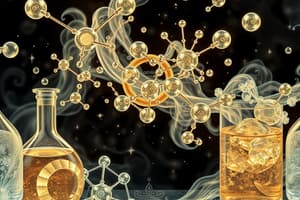Podcast
Questions and Answers
Which type of solutes dissociate in a solution and conduct electrical current?
Which type of solutes dissociate in a solution and conduct electrical current?
- Acids
- Non-electrolytes
- Ionic compounds (correct)
- Sugars
What is the main difference between electrolytes and nonelectrolytes in terms of electrical conductivity?
What is the main difference between electrolytes and nonelectrolytes in terms of electrical conductivity?
- Electrolytes dissociate in solution, while nonelectrolytes do not. (correct)
- Nonelectrolytes are always acidic, while electrolytes are always basic.
- Nonelectrolytes dissolve faster in water than electrolytes.
- Electrolytes contain only sugars, while nonelectrolytes contain salts.
What are colligative properties dependent on in a solution?
What are colligative properties dependent on in a solution?
- The concentration of the solute (correct)
- The temperature of the solvent
- The size of the solute particles
- The color of the solvent
In the context of colligative properties, what happens to the freezing point of a solvent when a solute is added?
In the context of colligative properties, what happens to the freezing point of a solvent when a solute is added?
Which application demonstrates the concept of boiling point elevation?
Which application demonstrates the concept of boiling point elevation?
What is the effect of adding more salt to water on its boiling point?
What is the effect of adding more salt to water on its boiling point?
Which of the following is NOT a characteristic of electrolytes?
Which of the following is NOT a characteristic of electrolytes?
Which type of solutes lacks the ability to dissociate in a solution and conduct electricity?
Which type of solutes lacks the ability to dissociate in a solution and conduct electricity?
water + more salt had a freezing point depression of -18°C compared to pure water. What is the normal freezing point (NFP) of water?
water + more salt had a freezing point depression of -18°C compared to pure water. What is the normal freezing point (NFP) of water?
Flashcards are hidden until you start studying




